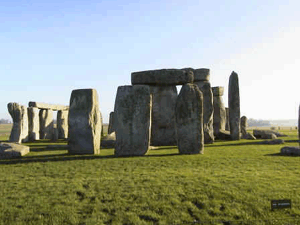
London information guide
|

Click here for Tours of London
|
|
Home > Outside of London> Stonehenge Guide

Stonehenge Information Guide
Over 4,000 years ago on the Salisbury Plain in Wiltshire England a
Neolithic people started construction on a stone monument. Eventually this
monument would become one of the most mysterious structures on Earth.
To date no one knows the complete reason why it was created but
whatever the reasons, the site continues to capture the hearts and minds of
millions.
This mystical monument that stands guard on the wind blown Salisbury
plain is the awe inspiring Stonehenge. About 137 kilometers west of
London it stands somewhat beaten up but overall strong against the ages.
Stonehenge still conveys a sense of majesty and power causing people to
stand and stare at what is likely one of England's greatest national
icons.
Stonehenge's original purpose is still unclear, but some have
speculated that it was a temple made for worship of ancient Earth deities. It
has also been called an astronomical observatory for marking significant
events on the ancient prehistoric calendar. Yet others claim that it
was a sacred site created by Merlin and King Arthur for the burial of
high-ranking citizens from societies of long ago.
Between 3,000 BCE and 1,400 BCE, Stonehenge was constructed in three
primary phases. It is made up of concentric layers of circles and
horseshoe patterns that slowly enclose the site. Completely surrounding the
site is a ditch and dirt bank. Inside thate is an outer Sarsen stone
circle, now mostly in ruin, followed by a smaller set of Bluestones,
also set in a circle. Within the center of the monument are trilithons
(two pillar stones with one stone on top) in the shape of a horseshoe.
Finally there is another smaller set of stones, also in a horseshoe.
Throughout the ages Druids, Romans, Greeks, Egyptians and many other
civilizations have been given credit for building Stonehenge. No matter
who ultimately built Stonehenge, they did so with a Herculean effort.
All of the stones were brought far distances using only muscle and
primitive tools. The sarsen stones are believed to have been brought from
Marlborough Downs, 30 kilometers to the North of Stonehenge. The
Bluestones are believed to be from the Preseli Mountains in Southwest Wales,
some 385 kilometers away.
Archaeologists far from understand everything about Stonehenge but some
alignments with solar and lunar bodies can be observed. The most known
of these alignments is the midsummer sunrise which rises above the Heel
stone when standing in the center of the circle. Additionally you can
mark the midwinter sunset and other lunar moments while standing from
specific spots within the stone circle.
No matter what the claim has been for Stonehenge's original purpose,
the truth is that it has inspired countless generations of people to
strive to learn and figure out the history of our past. Stonehenge is
somewhat a gateway into the past that shows that maybe our civilization
wasn't as technically challenged as we believed.
Much more Stonehenge information including pictures, legends, and
theories on its construction and purposes is available at: www.aboutstonehenge.info
Article contributed by Christiaan Stoudt from the aboutstonehenge.info website.
|
|



